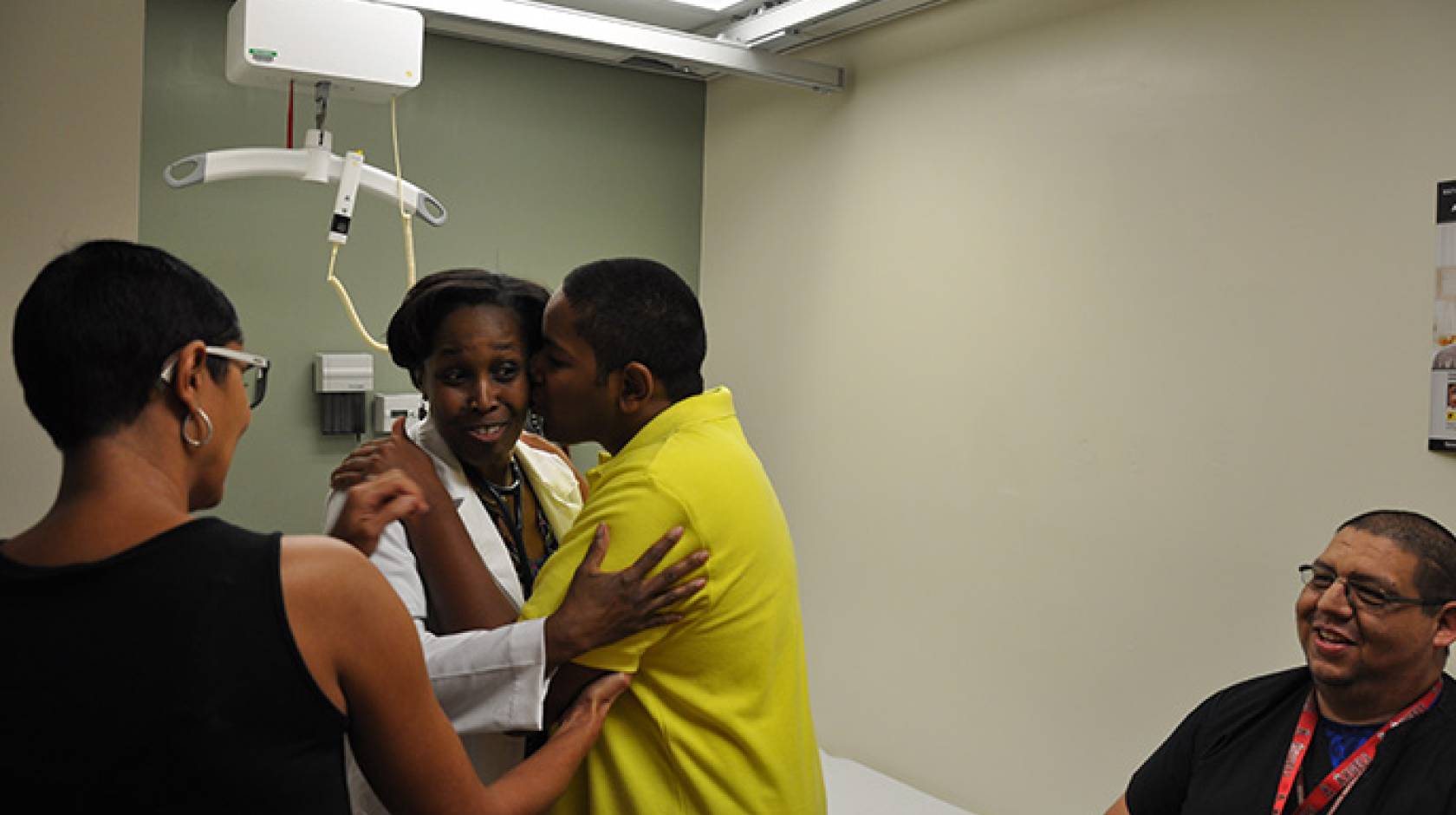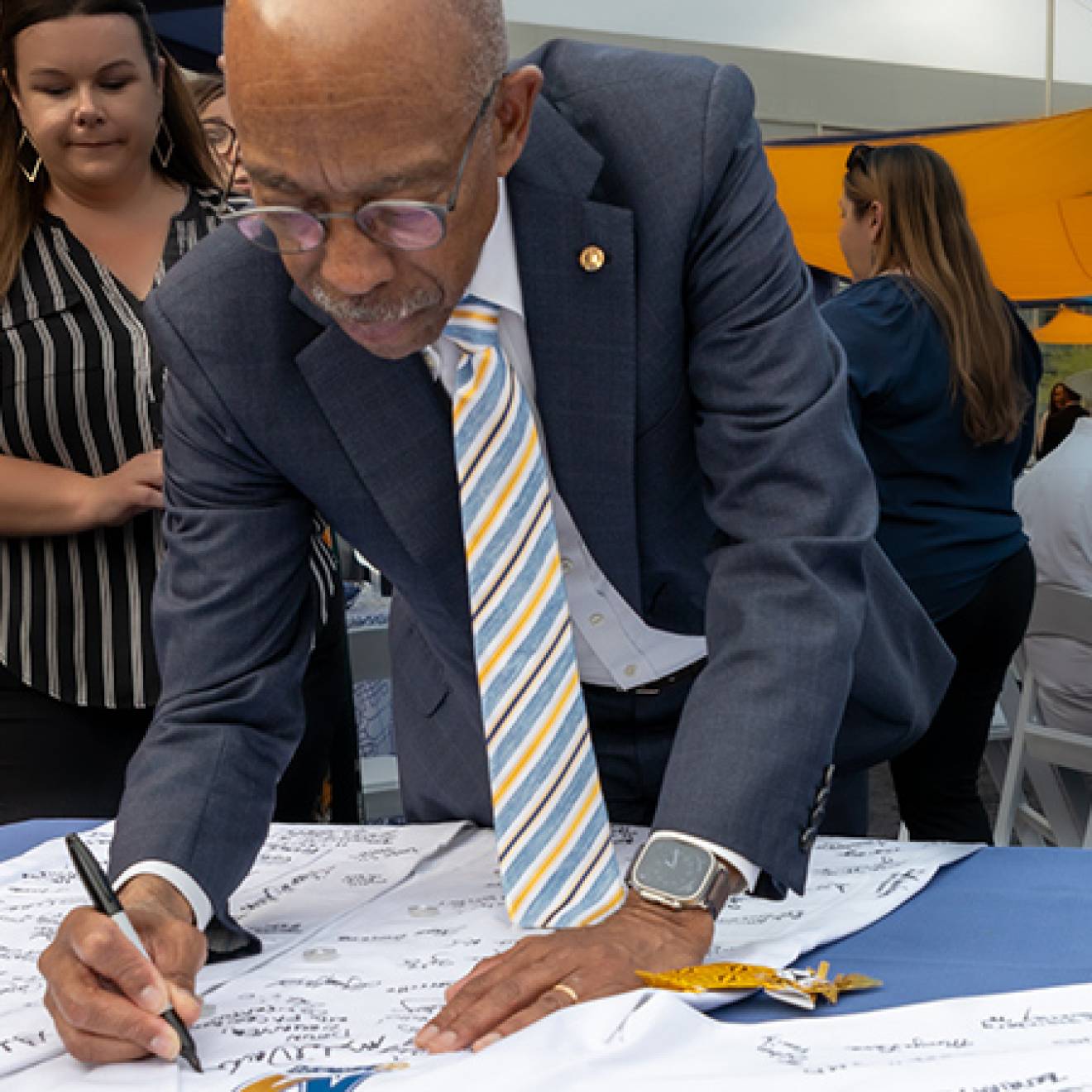Iqbal Pittalwala, UC Riverside

Debbie R., the mother of two autistic young men who suffer also from diabetes and seizures, remembers a time, many years ago, when it took weeks for her to get specialty referrals for her sons. The approval process was cumbersome. Many specialists were booked solid three months in advance.
Then she found the Access Clinic for developmentally disabled adults in Moreno Valley about five years ago – soon after the clinic began operation – and since then her sons have enjoyed a quality of life and level of health care she didn’t know were possible.
“The doctors and staff at the clinic made this happen,” she says. “We get the kind of caring and understanding at the clinic we were just not used to receiving. If I have a question or concern now, the doctor takes the time to hear me out and find resources for me. If I call the clinic, I get a response within 24 hours. This is like nothing I had to struggle with before.”
Zulmira T., mother of Kobe, 19, is equally grateful for the Access Clinic and the care it provides. She drives Kobe to it from Desert Hot Springs. Kobe has cerebral palsy, developmental delay and is nonverbal.
“At this clinic, we get a doctor who understands you, looks you in the eye, and gets it,” Zulmira says. “Before, I would take Kobe to a regular pediatric doctor who would most often have no clue as to where I was coming from. I wish there were more clinics like the Access Clinic for families like mine. When it accepted Kobe, it was like winning the lottery.”
Launched by Scott Allen, M.D., and Emma Simmons, M.D., a husband-and-wife team at the UC Riverside School of Medicine, in partnership with the Riverside University Health System (RUHS), the Access Clinic is housed at RUHS, 26520 Cactus Ave., Moreno Valley, and currently handles about 150 patients.
“To my knowledge, there is no similar clinic in the state,” Allen says. “My wife and I have a 22-year-old son with profound developmental disabilities. When we came to Riverside five years ago, care for people like him was seriously lacking and an unmet challenge. So Emma and I – we’re both primary care doctors – decided we’d open a clinic for developmentally disabled adults. We had conversations with RUHS, the Inland Empire Health Plan, UC Riverside and others. The result was a clinic within the family medicine clinic at RUHS. We’re immensely grateful to RUHS for giving us the space and staff.”
Arnold Tabuenca, M.D., chief medical officer at RUHS Medical Center, and chair of surgery in the UC Riverside School of Medicine, said, “Dr. Allen and his team provide individuals with complex disabilities a patient-centered and compassionate medical home. Such a high level of coordinated service is difficult to find in any scenario and we are proud to be delivering it to people within our own community.”
Grants that Allen and Simmons procured for the clinic from the Riverside Community Health Foundation helped purchase and install a ceiling track lift in one of the clinic’s two examination rooms. Comprised of an electronically operated system that can be lowered or raised and that moves around on tracks fitted to the ceiling, the lift, from which a sling is suspended, is appreciated by patients who are unable to climb on to a bed.
“The Riverside Community Health Foundation is a proud supporter of the Access Clinic,” said Daniel Anderson, D.Min., the foundation’s president and chief executive officer. “With its focus on a profoundly underserved patient population, the clinic’s purpose aligns with our mission to improve the health status of all members of our community. Also gratifying is seeing how so many community partners have come together in creating the clinic – the UCR School of Medicine, Riverside University Health System and the Inland Empire Health Plan, in addition to the foundation.”
One patient making use of the ceiling track lift is Jessica D., 28, who has cerebral palsy and is tube dependent. Half her brain had to be removed when she was a baby, her mother, Susan, explains.
“Oftentimes, Jessica must be lowered on to the bed using the sling, which makes it convenient for her,” she says. “At other clinics we went to in the past, they wouldn’t even weigh her. At the Access Clinic she is weighed on a wheelchair scale.”
The portable bariatric wheelchair scale, as well as a non-traditional, wider-than-usual exam table, were purchased with grant funding from the Riverside Community Health Foundation.
“When I call the clinic, they get things done,” Susan says. “Before I found this clinic, I had to constantly return to the doctor to get just one referral. And there was no continuity of care. Now Jessica gets the best care possible. I know she will not get this care easily elsewhere.”
Another grant from the Riverside Community Health Foundation made it possible for the clinic to have a full-time nurse case manager on staff: Melissa Seinturier.
“Our patients get to know Melissa and get attached to her,” Simmons says. “She is expert at negotiating the system. She connects people to the care that we may have ordered and, unlike the traditional model, she follows up with each patient and caregiver.”
An ambulatory practice liaison, Seinturier believes the Access Clinic’s popularity is closely tied to the way patients and their caregivers are welcomed, attended to and treated.
“We listen to our patients and we treat them as individuals,” she says. “A lot of physicians elsewhere, the caregivers tell me, don’t listen to them. At our clinic we arrange our schedules so we can spend more time – 10-30 minutes – with each of our patients.”
No wonder then that Jeannie D. drives her daughter Melissa to the clinic all the way from Hesperia. Melissa, 28, has cerebral palsy and autism. She was seriously injured in a car accident when she was 2 years old.
“We see both Dr. Allen and Dr. Simmons at the clinic,” Jeannie says. “Before Melissa began treatment with them, it was hard to find a doctor who could fully understand what she needed. Dr. Allen has helped us through emergency visits, what I should be asking of doctors there, and he helps me get the appointments my daughter needs.”
Seinturier, the case manager at the Access Clinic, would love to see the clinic replicated many times in California and beyond, and has tips for success.
“There is a big need for clinics like this one,” she says. “To get one going, you’d need the physical space for it, a lot of patience and the ability to adapt fast. This is not a routine clinic, after all. We see patients even outside the clinic, in their cars sometimes. Every day is a challenge, and completely different from other days gone by. You’d need, too, a case manager – someone to do the many referrals. And you’d be wise to have a licensed vocation nurse and a health services assistant on staff.”
Allen explains that he set up the clinic’s financing in a unique way, enabling patients to be seen more frequently than the patient might on average in an insurance plan.
“We anticipated it would take us longer to see each patient,” he says. “We worked with the insurer, Inland Empire Health Plan, to establish a higher reimbursement rate to support this higher level of care. We focus on better outcomes for our patients. As a result, the insurer, the patients, and their families feel this is a better way of doing business. We demonstrated a new care model, one that is more patient- and family-centered. And one that is financially viable and reproducible. We have basically created a clinical care program in the state that did not exist before.”
Caregivers like Debbie R., the mother of the two autistic boys, are pleased. She has no reservations about expressing her gratitude for the program’s existence.
“Here, we are not just a number,” she says. “At this clinic, it’s all about caring and understanding. As long as it’s there, we’ll keep coming.”

